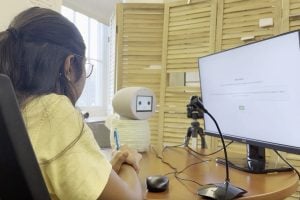Chien-Ming Huang, a John C. Malone Associate Professor in the Department of Computer Science, studies human-machine teaming and creates innovative, intuitive, personalized technologies to provide social, physical, and behavioral support to people with a variety of abilities and characteristics, including children with autism spectrum disorders.
Huang directs Johns Hopkins’ interdisciplinary Intuitive Computing Laboratory and is a member of the Malone Center for Engineering in Healthcare, the Laboratory for Computational Sensing and Robotics, the Institute for Assured Autonomy, and the Data Science and AI Institute. An expert in human-robot and human-computer interaction, Huang is particularly passionate about using novel technologies to help special-needs populations. Drawing on human-computer interaction, robotics, and artificial intelligence, Huang’s research has significant applications in health care, education, and manufacturing.
His lab develops interactive robot systems that work cooperatively with people to increase task performance and enhance user experience. Specifically, Huang’s team focuses on deciphering human behavioral cues such as eye gaze for recognizing task intent, synthesizing intuitive robot behaviors to facilitate collaborative activities, and developing interfaces and methods for people to re-skill robots to perform custom tasks.
Huang has received several awards, including a 2022 NSF CAREER Award and being named a prestigious John C. Malone endowed chair at Johns Hopkins. In 2018, he was selected for the ACM’s Conference on Human Factors in Computing Systems Early Career Development Symposium and the New Educators Workshop within its Special Interest Group on Computer Science Education. As a PhD candidate, Huang received Best Paper Runner-Up and Best Student Poster Runner-Up honors at the 2013 Robotics: Science and Systems (RSS) conference and was named a 2012 Human-Robot Interaction Pioneer.
A member of the ACM, Huang has published in Science Robotics and other top-tier journals and has received media coverage from MIT Technology Review, Tech Insider, Science News, and Science Nation. Huang is an associate editor for ACM Transactions on Human-Robot Interaction and is a guest editor for Frontiers in Robotics and AI’s research topic, “Towards Real World Impacts: Design, Development, and Deployment of Social Robots in the Wild.”
In addition to his numerous conference presentations, Huang served as a registration chair for the 2018 International Conference on Human-Robot Interaction and has co-organized several conference workshops, including workshops at the 2017 IEEE/RSJ International Conference on Intelligent Robots and Systems and the 2018 RSS conference. He is also a frequent participant in conference program committees and has reviewed numerous journals, conference papers, and NSF proposals.
Huang received his BS (2006) at National Chiao Tung University in Taiwan, his MS (2010) at the Georgia Institute of Technology, and his PhD (2015) at the University of Wisconsin–Madison, all in computer science. He completed his postdoctoral research at Yale University before joining Johns Hopkins as faculty in 2017.



